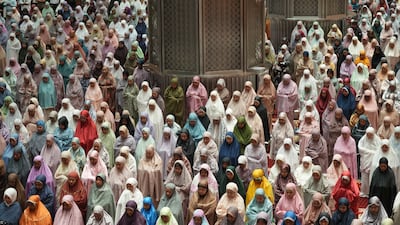Muslims around the world are observing their first week of fasting for Ramadan, but prayer times and fasting hours can vary significantly depending on location. Observers must abstain from food, drink and other physical needs from dawn (fajr) until sunset (maghrib). Daylight hours, therefore, influence the fasting duration for Muslims across the globe.
Daily prayer times for the UAE are revealed by the General Authority of Islamic Affairs and Endowments. Below are the prayer times for the month of March, which this year coincide with Ramadan's dates.
Prayer times in the UAE for March 2025
What is Ramadan?
The month of Ramadan is when able Muslims fast from food, drink and oral medicine from sunrise (fajr) to sunset (maghrib). Once the Sun sets, Muslims break their fast with a meal called iftar.
Considered the holiest month in the Islamic – or Hijri – calendar, Ramadan is believed to be when the Quran was revealed to the Prophet Mohammed. It is a time when Muslims strengthen their faith through prayer, recitation of the holy book and charitable acts.
How long does fasting last each day?
With the holy month falling earlier this year, Muslims can expect to fast for a slightly shorter time period than they did last year but the duration lengthens towards the end of the month.
This year, Muslims in the UAE will begin the month by fasting for about 14 hours and 13 minutes. The fasting time will steadily increase as the holy month progresses. By the end of Ramadan, the fast will last for 14 hours and 55 minutes.
In contrast, in northern cities such as Reykjavik and Tromso, fasting hours can extend well beyond 18 or even 20 hours in winter. In some extreme cases, where the Sun does not set or rise fully (such as in parts of northern Finland and Sweden during summer and winter months), scholars recommend following the fasting hours of Makkah or a nearby moderate location.
What time do Muslims pray during Ramadan?
Prayer is one of the five pillars of Islam and Muslims are obliged to pray five times a day: fajr, dhuhr, asr, maghrib and isha. Throughout the holy month, an additional extended evening prayer called taraweeh is performed after isha.
During the last 10 nights of Ramadan, when Muslims increase their piety, some may choose to perform tahajjud prayers – also known as qiyam al layl – which are carried out after taraweeh throughout the night.
Muslims typically try to pray at mosques as it is thought there is greater reward in communal prayer.

















